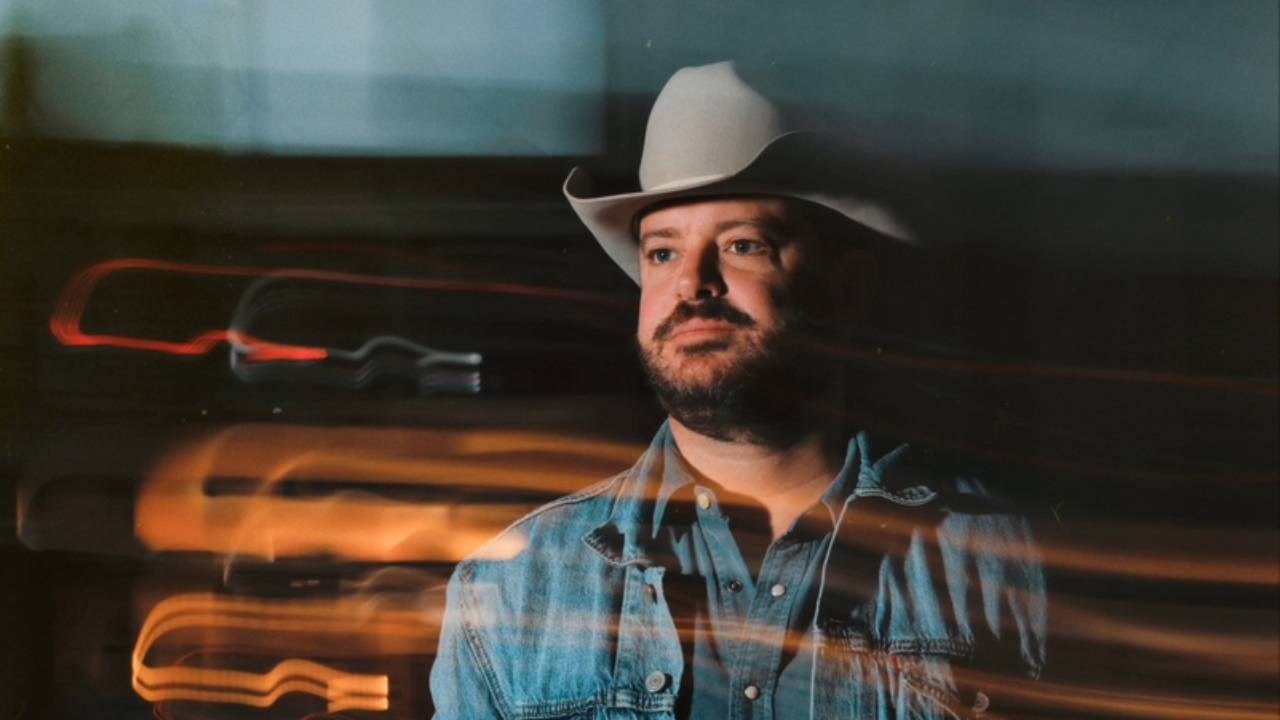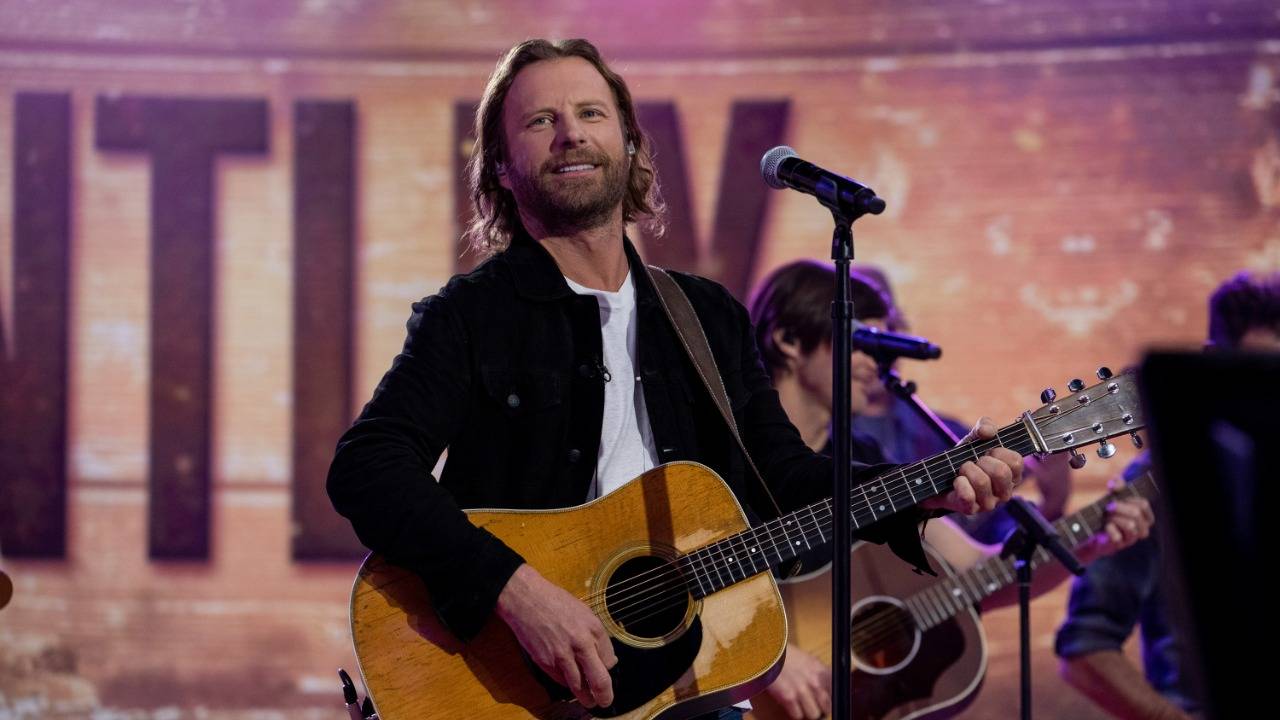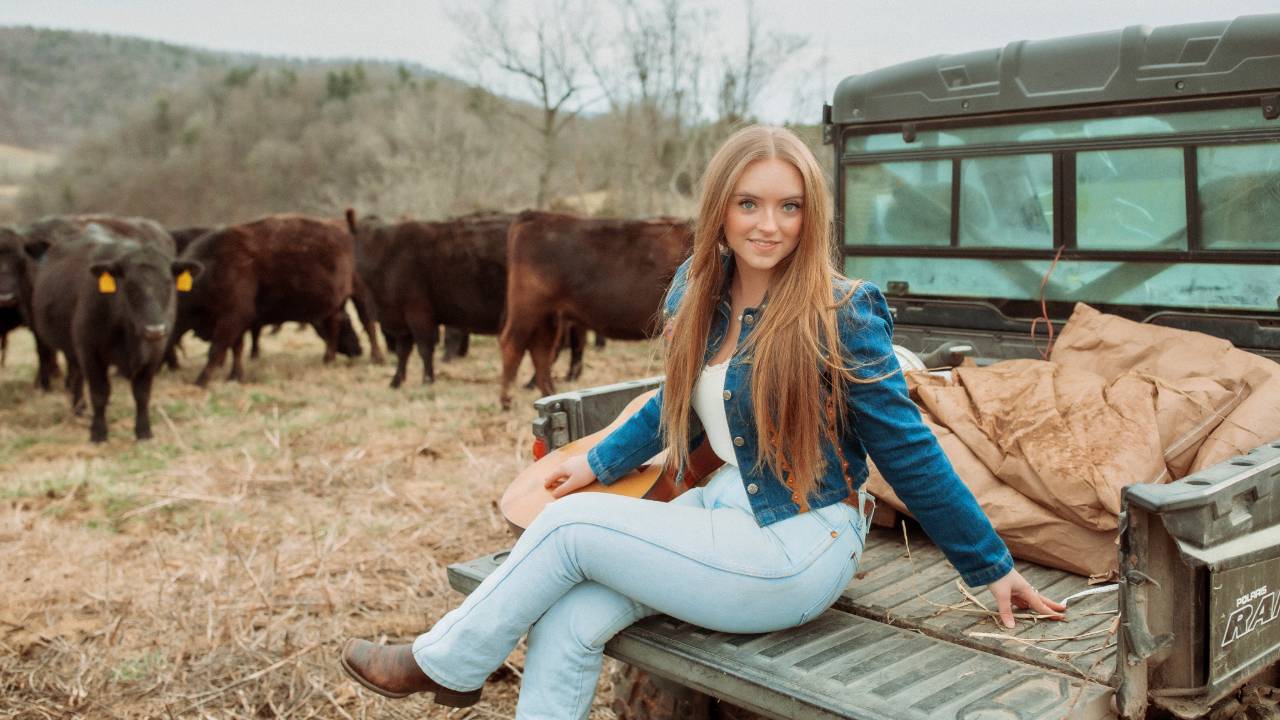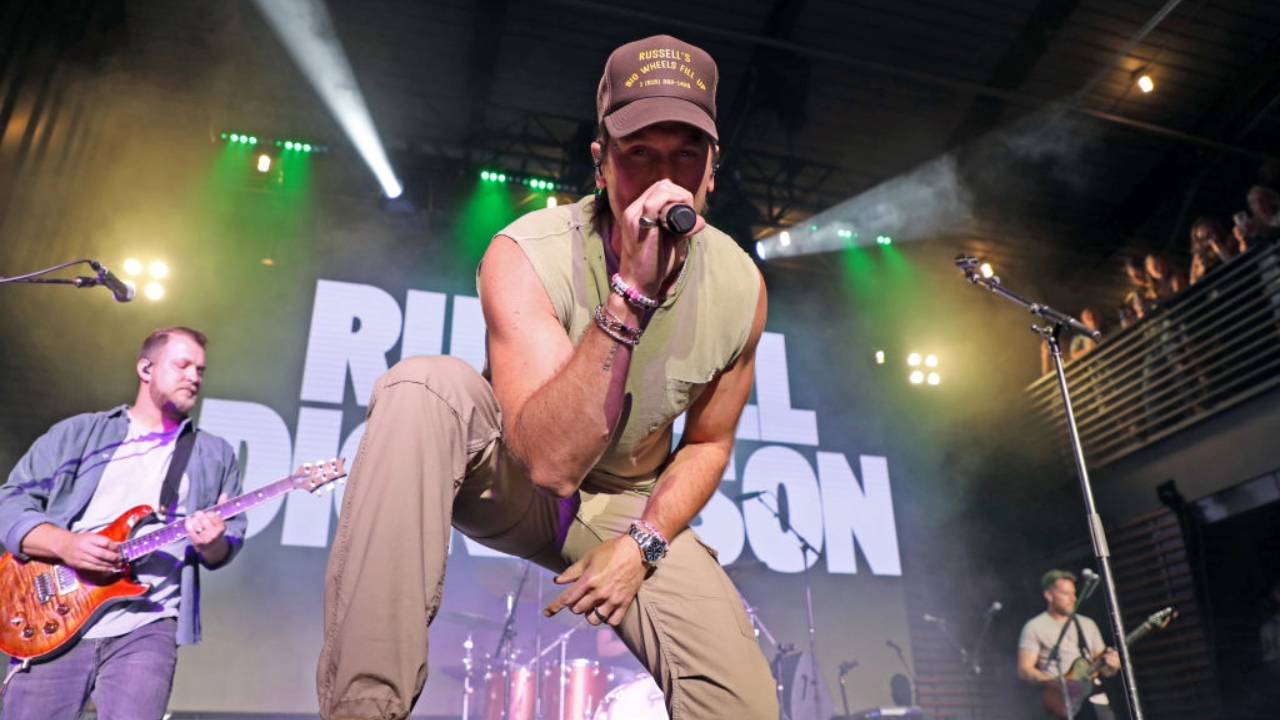Vince Gill Talks About 'These Days'
(Editor's note: Vince Gill and Alison Krauss will be featured on a new episode of CMT Cross Country debuting Friday (Oct. 27) at 10 p.m. ET/PT.)
Vince Gill is receiving some of the strongest accolades of his already-celebrated career with These Days, his new four-CD boxed set. But while most artists release boxed sets essentially as an elaborate package of their greatest hits, These Days consists of 43 new songs he co-wrote and performed in a variety of musical styles.
The individual CD titles tell much of the story: Workin' on a Big Chill -- The Rockin' Record, The Reason Why -- The Groovin' Record, Some Things Never Get Old -- The Country & Western Record and Little Brother -- The Acoustic Record. While only four tracks feature actual duets, other musicians and vocalists include Diana Krall, Rodney Crowell, John Anderson, Guy Clark, Alison Krauss, Sheryl Crow, Bonnie Raitt, Phil Everly, the Del McCoury Band, Emmylou Harris, John Anderson, Lee Ann Womack, Amy Grant, LeAnn Rimes, Gretchen Wilson, Trisha Yearwood, Bekka Bramlett, Michael McDonald and others.
Asked how fans will react to the musical diversity, Gill told CMT.com, "They've had all this stuff in much smaller doses. Maybe there's a solo on one of my records that tips its hat to bluegrass, but now there's kind of a whole record of all this stuff."
With the four-CD set selling for less than $25 at most retailers, These Days debuted at No. 4 this week on Billboard's country albums chart and at No. 17 on the all-genre Billboard 200. After launching the project with a concert and media appearances in New York, Gill will continue to promote his new music during a national tour that continues through Dec. 9 with a three-night engagement at the Las Vegas Hilton.
During a recent visit to CMT's offices in Nashville, Gill talked at length about the motivation behind the unprecedented concept for the album.
When I was first told you were working on a four-CD set of all new music, I found the concept a little hard to totally grasp. Has that been the general reaction?
I think so. Somebody asked me, "Why do think this is something other people haven't done?" And I say, "Well, I don't know that a lot of people could do it." It's going to take a pretty hardcore musician to be able to really define the differences and pull off the differences. ... Whether it's me singing with Diana Krall or Del McCoury, I want it to be authentic. And as I listen to them, my ears tell me that both things are authentic, and they're not a country singer who thinks he's this or that. I just think the labels are the things that are limiting. Once you get labeled, it's like, "Hey, now you've really done it. You've stuck me with something, and I'm not that."
During the '80s, when people like Rodney Crowell and Lyle Lovett were getting radio airplay, things seemed to be a lot more open in terms of the public's attitude toward country music and music in general. What happened?
To me, it just started shrinking. A big part of it is the consolidation of all things. You can't blame just radio, because the record companies have done the exact same thing that radio has done -- and consolidated, consolidated and consolidated. Our country has done that. No matter whether it's Wal-Mart or whether it's the family farmers or whatever it is, that's a big part of the way everything's going. It's squeezing people out. In a curious kind of way, I feel like we're decimating the middle class. But that's another issue. (laughs)
It seems that what you're doing with the album is just the opposite of consolidating.
Exactly. To me, the pressure's off. There's no reason I should expect to have hit records -- that I should expect that radio will play my records. The last several years have dictated to me that that's not the case. I don't begrudge. There's no ill will. I know that's just how things work. What really helped me was a conversation with Eric Clapton. He called and asked me to come play at his guitar festival down in Texas, and the words he used were, "I'm only inviting people I admire." I thought, "Well, shoot. He sees me for what I really am -- and that's a musician." I just decided to kind of cut loose with the labels, cut loose with the tags, cut loose with the expectations of what people perceive me to be -- and just go play.
But in the back of your mind, were you still subconsciously thinking, "I have to be this to get through at country radio"?
It's always changing. I think whatever I did in the early '80s didn't fit with what was going on. In the '90s, it did. And now, in this new generation, it doesn't seem to be. But I don't know why. I can't worry about why. I'm not going to chase what everybody else is doing. That, to me, doesn't represent artistry at all.
There's not a lot of record company executives who would approve the release of a four-disc package of new music by any artist, but Luke Lewis at the UMG Nashville came up with the idea for the boxed set?
It was my idea to do it, but I had no intention of doing it when we started the record. I was just going to do 11 or 12 sides and finish it to make my record. But I had all these songs written, and I was disappointed because I wasn't going to get to them. I thought there are some really nice songs on there that I'd like to see what they could become. Plus [I thought], "To heck with it. I'm just going to record until I feel like I've gone down some roads that I may choose to go down." I kind of looked up a couple of months later and there were all these songs. I thought, "Now what am I going to do? They're probably going to make me kick two-thirds of this stuff off. I'll pick the best stuff and finish it." But I liked everything.
Then I got to looking at a poster of the Beatles with all the release dates of their records. At one point, they released three different albums within a year of each other. That gave me a great idea. I thought, "Why don't I go finish all these records and put them out every two or three months -- each one different." Stylistically, they all fell into a pretty neat place. I went to Luke and said, "I have this idea. Rather than convince everybody who's not on board with us, let's go to the people who are. I think there's a core fan that will buy just about anything I put out. Let's go honor them for a change. We'll sell three times as many records. They'll buy each one of them, I think. It would be something unique and different than what we normally do."
So we went to work on that, and then he thought about it more and more about how it was gong to work. He said, "You ought to go do one more record. You've always wanted to do a bluegrass record. Do that, and we'll put all out at the same time as a boxed set rather than each one separately." The pricing of it is going to be the saving grace.
I don't think even Prince has attempted anything quite this ambitious. Or was it ambitious?
It came about from an honest place. I can hold my head up and say that I'm not trying to get in the Guinness Book of Records for something quirky and different that nobody has ever done. I never even thought about it. These are just things I possess in my life that I love doing. I love playing bluegrass. I love playing my guitar as loud as it'll go and playing the blues and pretending I'm Eric Clapton. And I love the twangiest honky-tonk country music that you can make.
A lot of people probably assumed that the guest appearances by people like Bonnie Raitt, Michael McDonald and Sheryl Crow were going to be big showcase duets, but that's not the case. The only real duets are with Diana Krall, Rodney Crowell, John Anderson and Guy Clark.
There's only four duets out of 43 songs -- one on each record. If you look at all my records, there's a whole lot of those people who are on them from time to time. It just looks more massive because there's four records' worth of guests.
The guest vocals mainly give different textures and dimensions to the music.
That's the idea. And, once again, with the task of making 43 songs interesting, how are you going to do that? You couldn't just have -- start to finish -- just me all the time, so those different characters are what make it interesting to listen to. Each song sounds different. And it's in line with my life. It's in line with what I've done for a living for 30-plus years of singing on everybody else's records. This is not me trying to get them to pay me back. It's just the way I think, the way I record. It's the way I've always done it, so it's nothing new to me.
Who were the singers you'd never worked with before?
Diana Krall would be one. LeAnn Rimes would be one. Katrina Elam, I put in a little bit of work on her first record, but I don't think it was even on the album. Gretchen would be a new one. John Anderson.
The Workin' on a Big Chill disc is generally more lighthearted than the other three.
No question. That's like a Delbert McClinton record -- fun, funky grooves, horns.
Most of the lyrics on that CD don't imply love as much as the actual sex act.
Yeah, you don't want to be playing the greasiest, dirtiest guitar in the world and have the lyrics be all warm and fuzzy. It's got to be a little dirty. Without a nasty side to it, it's not much fun.
The music gets a little deeper on the second disc with the string arrangements by David Campbell, who has worked with Sheryl Crow and Elton John.
When I talked to him, he said, "What do you have in mind?" I said, "You. I have you in mind. I don't have me in mind. More than anything, what I want you to do is not perceive that these are string charts for a country artist. Just listen to these songs and honor them as honestly as you can." And he did. I think the arrangements are almost Beatlesque in spots. You can listen to the drum fills. You can tell that the note choices are really unique.
Some producers will hire someone out of left field to work with an artist, but when it comes right down to it, they won't allow that person do what they do best.
Those are the control freaks. To me, I think what happens on the majority of this record is that nothing in a big way got reigned in, so to speak. If something wanted to be the blues, it got to go all the ways to be that. If it wanted to be bluegrass, it got to be as twangy as bluegrass gets. It got to be authentic all the way across the board. I'm the furthest thing from a control freak. I like creative people. I like calling so-and-so because of what they have the ability to do, not because I want to tell them what I think they should do.
Diana Krall is featured on "Faint of Heart," one of the songs you wrote with Al Anderson. How did the duet with her come about?
We've been friends for quite some time. We would wind up spending time together at the Grammys. We both recorded for the same parent record company for years, so we'd go to the after-parties that were always filled with big, giant stars. We surmised that nobody wanted to hang out with a jazzer or a hillbilly singer, so we'd pal around together. As soon as Al and I started writing this song, I said, "Diana's got to do this somehow, someway." I tried to track her down for a long time. Then out of the blue, when I least expected it, she called me. She was in town with Elvis Costello when he was doing the Opry at the Ryman with Emmylou Harris. She said, "I love this song. I want so bad to try to record it. I don't know when we can, but let's try to figure it out." Then she said, "Elvis is doing the Opry. We could do it tomorrow. I'm not doing anything." I said, "OK!" We threw a session together on a Saturday morning. It was all live.
The song you and Amy wrote, "Tell Me One More Time About Jesus," gets across the message without really preaching.
I got the biggest compliment from Bill Gaither, who might be the most famous of all gospel songwriters. He said, "There's a way you country guys write songs of faith that are different than we do. It's not filled with quite so much God-speak. It's a little more organic." ... Once again, a kind of an R&B feel is the last thing you're going to hear about a song like this.
One of the discs moves into hard country. How difficult is it to write and record songs that pay tribute to classic country without actually rewriting existing songs?
I think [the country classics] borrowed from old songs, themselves. Melodically, I think you could find 100 songs that weren't that far away from each other, especially the shuffles. To me, it's those feels. Those country feels are what's going away. With what everybody's doing today, I guess they're country songs because they're on country radio, but they're not steeped in that tradition of the feel. That's what I go after, more so than anything, and then try to find a way to write a new song with an old feel.
It is hard to do something much different? Was Merle Haggard a whole lot different from Lefty Frizzell? I'm sure he was, but you can hear it. To me, the emulating is flattering. I don't think anybody's gonna come up with something new.
On the album, you're not at all reluctant to acknowledge that.
I don't know why anyone would. I think it would be arrogance and ego that would lead someone to believe that they're doing something that's never been done before. I got a lesson from that with the Chieftains. I did some recording with them, and they wanted me to do "The Streets of Laredo." They said, "You know this old song, don't you?" I said, "Yeah, it's a great old cowboy song." They said, "Do you realize that the same melody is over 400 years old in our country? It's a song called 'The Bard of Armaugh.'" Once again, you can go back and realize that nothing is new.
You managed to get Buddy Emmons, the legendary steel guitarist, back into the studio for some of the country sessions.
I don't know that he'll go do a whole lot of sessions anymore. One of the greatest coups of the record, to me, was getting to play music with him. He's the definition of that instrument. When we did the song, "This New Heartache," it goes through some song titles. Well, he played on all of those records.
Phil Everly joined you on "Sweet Little Corrina," a song that sounds a bit like the Everly Brothers "Bye Bye Love." How much does he work these days?
Hardly at all. Once again, some of these collaborations were different than anything I've ever done. I think the Everly Brothers might have made the greatest records that have ever been made. What I loved about the Everly Brothers was that seamless harmony where they sounded like one person. They were so connected with the bloodline, it was mesmerizing to hear them. That what I spent the last 30 years trying to do on everybody's record I ever sang on -- Phil Everly singing the perfect, great harmony.
How many more albums are left on your contract with MCA?
I think one more project. I don't know what I'm gonna do. I don't know what they want to do. We'll just cross that bridge when we come to it. I'd stay there. I'm a loyal guy. I like my relationship with them. I know it's a different regime and people who were never there when I had my best success. But I still feel like it's my name at the top of the CD, and it's either gonna work or not because of that.
Do you think having the freedom to release These Days will affect the way you approach your next album?
I don't know. I'm not a planner. This project was not planned. It became this, but I did not plan it. I'm an off-the-cuff guy. I like to wing it. I just like to roll with it. I can't have it all mapped. Then, it gets boring to me.





